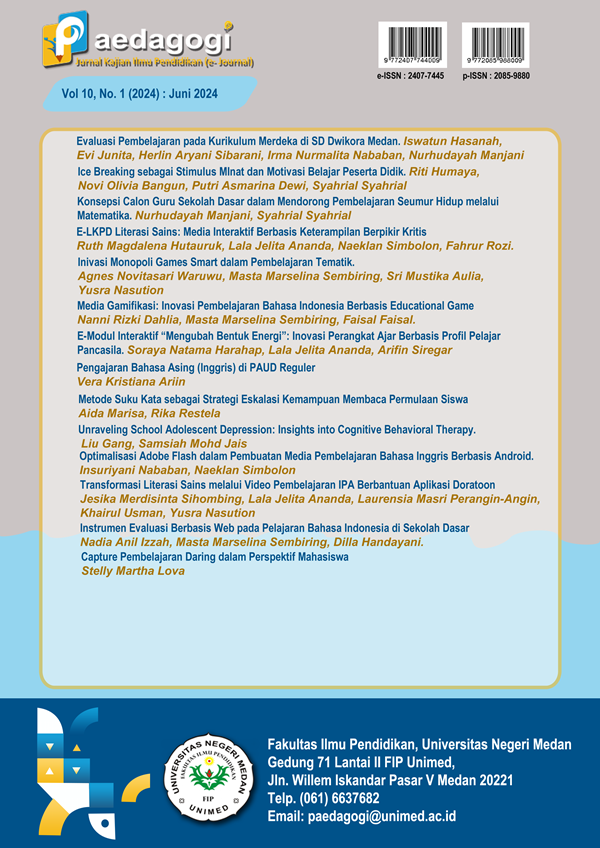Konsepsi Calon Guru Sekolah Dasar dalam Mendorong Pembelajaran Seumur Hidup melalui Matematika
DOI:
https://doi.org/10.24114/paedagogi.v10i1.58154Keywords:
Calon Guru Sekolah Dasar, Pembelajaran Seumur Hidup, MatematikaAbstract
Penelitian ini bertujuan untuk mengeksplorasi konsepsi calon guru sekolah dasar tentang pembelajaran seumur hidup melalui matematika. Melalui pendekatan kualitatif, enam responden yang sedang menjalani pendidikan dalam program PGSD diwawancarai menggunakan pertanyaan semi-terstruktur. Hasil analisis data mengungkapkan bahwa para responden memiliki pemahaman dasar tentang pembelajaran seumur hidup, tetapi keragaman contoh yang mampu diberikan masih terbatas pada konteks tertentu. Tantangan utama yang dihadapi adalah kurangnya pemahaman mendalam tentang integrasi konsep tersebut, serta kurangnya contoh konkret yang relevan. Strategi untuk mengatasi tantangan ini mencakup pengembangan pendekatan pembelajaran yang kontekstual, peningkatan kolaborasi antara guru, orang tua, dan komunitas, serta pemanfaatan teknologi dalam mendukung pembelajaran yang lebih interaktif.References
Boaler, J., & Watterworth, J. (2007). Barriers to implementing lifelong learning in mathematics. Journal of Mathematics Teacher Education, 10(4), 267-288.
Burton, L. (2004). Rethinking mathematics education: A guide for teachers and parents. London: Routledge.
Chick, H. J., & Smith, D. A. (2014). Engaging parents in mathematics education: Strategies for school, home, and community collaboration. London: Routledge.
Chick, H. L., & Walshaw, G. (2005). Teacher professional development for lifelong learning in mathematics. Educational Studies in Mathematics, 57(1), 141-164.
Childs, S. B., & Kiely, A. D. (2022). Preparing Pre-Service Mathematics Teachers for Lifelong Learning: A Critical Review of the Literature. Journal of Mathematics Teacher Education, 25(3), 233-252. Doi: 10.29333/ejmste/10863
Fosco, C., Bennett, J., & Gewertz, C. (2007). The role of teacher education in preparing teachers for lifelong learning in mathematics. Journal of Mathematics Teacher Education, 10(4-5), 377-391. https://www.academia.edu/1098697/The_role_of_teacher_education_courses_in_developing_ hers_subject_matter_knowledge_and_pedagogical_content_knowledge
Guglielmino, A. (2019). Lifelong learning: Principles, strategies, and applications. London: Routledge.
Herrington, J. D., & Kemp, C. J. (2014). The digital revolution in mathematics education: How technology can transform teaching and learning. London: Routledge.
Martin, D. (2016). Community mathematics: A pathway to access and equity. London: Routledge.
National Research Council. (2000). Preparing teachers for a changing world: What teachers need to know and be able to do. National Academies Press.
Nuha, N. T., Putri, S. A., Azzunkha, P. L., & Susilo, B. E. (2024). Kajian Teori: Pendekatan Pembelajaran Kontekstual Guna Meningkatkan Kemampuan Pemecahan Masalah Matematis. PRISMA, Prosiding Seminar Nasional Matematika 4, 324-327. https://proceeding.unnes.ac.id/prisma/article/view/2969
Schacter, D. L., Gilbert, D. T., & Winquist, M. (2011). Memory. New York: Psychology Press.
Schifter, D., Ball, L., & Brink, J. M. (2020). Mathematics for all: Preparing teachers for a changing world. London: Routledge.
Stigler, J. W., & Hiebert, J. (2016). How to Teach Math for the World: A Comparative Approach, Second Edition. London: Routledge.
Sulianto. (2016). Pendekatan Kontekstual dalam Pembelajaran Matematika untuk Meningkatkan Berpikir Kritis pada Siswa Sekolah Dasar. Pythagoras, 10(1), 55-6. https://journal.uny.ac.id/index.php/pythagoras/article/view/555
Downloads
Published
Issue
Section
License
Copyright (c) 2024 Nurhudayah Manjani, Syahrial Syahrial

This work is licensed under a Creative Commons Attribution-ShareAlike 4.0 International License.
Authors published with the Paedagogi: Jurnal Kajian Ilmu Pendidikan (e-journal) agree to the following terms:
- Authors retain copyright and grant the journal the right of first publication with the work simultaneously licensed under a Creative Commons Attribution License (CC BY-SA 4.0) that allows others to share the work with an acknowledgment of the work's authorship and initial publication in this journal.
- Authors are able to enter into separate, additional contractual arrangements for the non-exclusive distribution of the journal's published version of the work (e.g., post it to an institutional repository or publish it in a book), with an acknowledgment of its initial publication in this journal.
- Authors are permitted and encouraged to post their work online (e.g., in institutional repositories or on their website) prior to and during the submission process, as it can lead to productive exchanges, as well as earlier and greater citation of published work. (See The Effect of Open Access)


